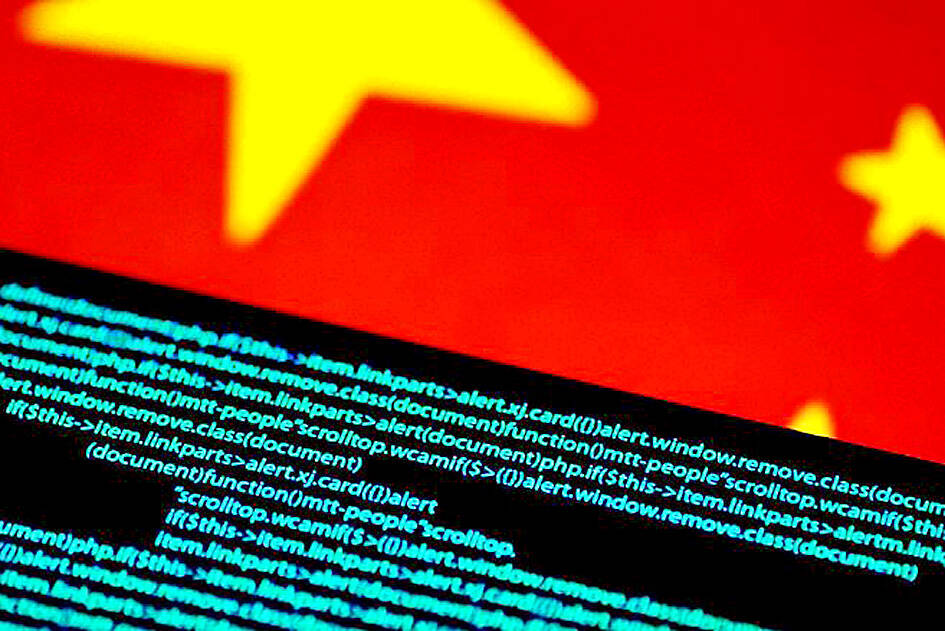Beijing’s cognitive warfare tactics against Taiwan are becoming more sophisticated, with hackers targeting network devices to spread disinformation as next year’s presidential and legislative elections near, prosecutors and judicial authorities said, adding that several hacks targeting Taiwanese had been traced to Hong Kong.
Cognitive warfare tactics against Taiwan are constantly evolving, from disseminating disinformation through crude messages using simplified Chinese characters and Chinese slang during the COVID-19 pandemic to spreading false news through nearly 1,500 social media accounts during the run-up to last year’s local elections, sources familiar with the matter said.
This year, foreign forces have shifted their methods, hacking Internet of Things (IoT) devices in Taiwan that use weak passwords to spread disinformation as though it was coming from a Taiwanese, the sources said.

Photo: REUTERS
The hackers seek to publish messages through a target’s social media account after gaining control of their devices, and then delete connection records to try to hide the origin of the poster, they said.
The actions are an attempt to divide Taiwan from within to intensify political conflicts, they said.
Investigators looking into the hacking cases said that Hong Kong has become an important base for launching cyberattacks against Taiwan, as major recent disinformation campaigns have been found to have originated in Hong Kong.
For example, online posts saying that officials had smuggled cigarettes during the president’s trip to Central America in April came from a hacked router in a motel in Kaohsiung, the Cyber Security Investigation Office said.
Using an Internet protocol address in Hong Kong, a hacker logged into a Facebook account they created and took control of two accounts of Taiwanese on the Mobile01.com Web site, and used the three accounts to make posts showing altered cigarette purchase orders, it said.
Although the hacker deleted their connection records, authorities traced the posts on the three Taiwanese accounts to the router, prosecutors and judicial authorities said.
Regarding online rumors in April saying that Chinese missiles had breached Taiwan’s airspace, the Cyber Security Investigation Office said that those posts had also originated in Hong Kong.
A foreign actor had hacked into a router of an international shipping company in Taoyuan through a device in Hong Kong at UCloud Technology Co (優刻得), which offers colocation services for servers and network equipment, and logged into a Professional Technology Temple (PTT) bulletin board system account owned by a Taiwanese to post about the missiles, it said.
To prevent disinformation from affecting the elections, the Taipei District Prosecutors’ Office is heading up an investigation team focused on major national disinformation cases, while other cases are to be handled by local district prosecutors’ offices, the Supreme Prosecutors’ Office said.
Dedicated chief prosecutors are to be assigned by local offices in the six special municipalities to handle the cases, it added.
The Ministry of Justice Investigation Bureau urges people to delete unused social media accounts, update their IoT devices and use strong passwords.
People should carefully verify online information and avoid spreading it before confirming its authenticity, the bureau added.

CHAOS: Iranians took to the streets playing celebratory music after reports of Khamenei’s death on Saturday, while mourners also gathered in Tehran yesterday Iranian Supreme Leader Ayatollah Ali Khamenei was killed in a major attack on Iran launched by Israel and the US, throwing the future of the Islamic republic into doubt and raising the risk of regional instability. Iranian state television and the state-run IRNA news agency announced the 86-year-old’s death early yesterday. US President Donald Trump said it gave Iranians their “greatest chance” to “take back” their country. The announcements came after a joint US and Israeli aerial bombardment that targeted Iranian military and governmental sites. Trump said the “heavy and pinpoint bombing” would continue through the week or as long

TRUST: The KMT said it respected the US’ timing and considerations, and hoped it would continue to honor its commitments to helping Taiwan bolster its defenses and deterrence US President Donald Trump is delaying a multibillion-dollar arms sale to Taiwan to ensure his visit to Beijing is successful, a New York Times report said. The weapons sales package has stalled in the US Department of State, the report said, citing US officials it did not identify. The White House has told agencies not to push forward ahead of Trump’s meeting with Chinese President Xi Jinping (習近平), it said. The two last month held a phone call to discuss trade and geopolitical flashpoints ahead of the summit. Xi raised the Taiwan issue and urged the US to handle arms sales to

BIG SPENDERS: Foreign investors bought the most Taiwan equities since 2005, signaling confidence that an AI boom would continue to benefit chipmakers Taiwan Semiconductor Manufacturing Co’s (TSMC, 台積電) market capitalization swelled to US$2 trillion for the first time following a 4.25 percent rally in its American depositary receipts (ADR) overnight, putting the world’s biggest contract chipmaker sixth on the list of the world’s biggest companies by market capitalization, just behind Amazon.com Inc. The site CompaniesMarketcap.com ranked TSMC ahead of Saudi Aramco and Meta Platforms Inc. The Taiwanese company’s ADRs on Tuesday surged to US$385.75 on the New York Stock Exchange, as strong demand for artificial intelligence (AI) applications led to chip supply constraints and boost revenue growth to record-breaking levels. Each TSMC ADR represents

Pro-democracy media tycoon Jimmy Lai’s (黎智英) fraud conviction and prison sentence were yesterday overturned by a Hong Kong court, in a surprise legal decision that comes soon after Lai was jailed for 20 years on a separate national security charge. Judges Jeremy Poon (潘兆初), Anthea Pang (彭寶琴) and Derek Pang (彭偉昌) said in the judgement that they allowed the appeal from Lai, and another defendant in the case, to proceed, as a lower court judge had “erred.” “The Court of Appeal gave them leave to appeal against their conviction, allowed their appeals, quashed the convictions and set aside the sentences,” the judges